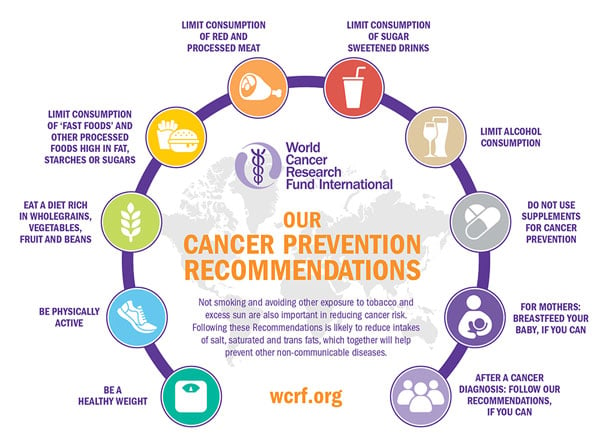 To help reduce the risk of cancer, be physically active as part of everyday life – walk more and sit less.
To help reduce the risk of cancer, be physically active as part of everyday life – walk more and sit less.
One of our Cancer Prevention Recommendations is to be physically active as part of everyday life – walk more and sit less.
There is strong evidence that physical activity protects against cancers of the colon, breast and endometrium, and that it helps prevent excess weight gain.
There is convincing evidence that physical activity (of moderate or vigorous intensity) protects against colon cancer.
Physical activity (of moderate or vigorous intensity) probably protects against postmenopausal breast cancer and endometrial cancer. Physical activity at a vigorous intensity probably protects against premenopausal breast cancer.
There is convincing evidence that walking protects against weight gain, overweight and obesity. Aerobic physical activity probably protects against weight gain, overweight and obesity. There is also strong evidence that screen time, which is a marker of sedentary living, is a cause of weight gain in children and adults. We know that greater body fatness is a cause of many cancers, therefore, physical activity may indirectly reduce risk of obesity-related cancers.
People whose work is sedentary need to take special care to build physical activity into their everyday lives. The World Health Organisation advises adults to be active daily and do at least 150 minutes of moderate physical activity or at least 75 minutes of vigorous physical activity a week. We consider this the minimum amount necessary.
For cancer prevention, it is likely that the more exercise you do, the greater the benefit. But exercise doesn’t just mean going to the gym. Moderate activity might be household chores while vigorous activity might be swimming fast lengths in the pool or playing tennis.
– Dr Panagiota Mitrou, Director of Research Funding and Science External Relations
Watching television or screens, including at work, and using electronic devices, such as playing games consoles, are forms of sedentary behaviour. In most parts of the world, levels of physical activity are insufficient for optimal health.
People watching screens are often exposed to intensive marketing of highly processed food and drink high in fat or sugar and may be consuming energy-dense snacks and drinks while watching.
Many occupations involve prolonged periods of sitting. However, both adults and children should minimise the amount of time they are sedentary. Although evidence for sitting time as a risk for cancer (for example, endometrial cancer), and as a determinant of weight is still emerging, it is likely that extended periods of sitting may promote weight gain and so indirectly increase cancer risk.
In most parts of the world, levels of physical activity are insufficient for optimal health. A whole-of-government, whole-of-society approach is necessary to create environments for people and communities that are conducive to being more physically active and less sedentary.
A comprehensive package of policies is needed to promote and support physical activity, including policies that influence the food environment, the food system, the built environment and behaviour change communication across the life course. These policies can also help contribute to a sustainable ecological environment. Policymakers are encouraged to frame specific goals and actions according to their national context. Find out more on policy action for cancer prevention.
Our Recommendations work together as an overall way of living healthily to prevent cancer.
> Download a PDF that details all the information about our Recommendations
